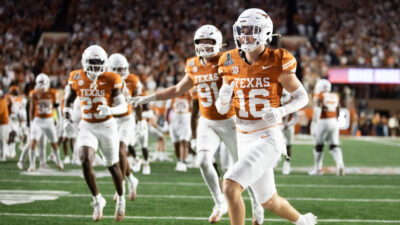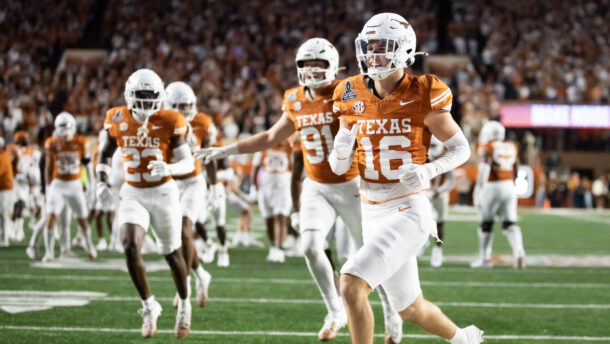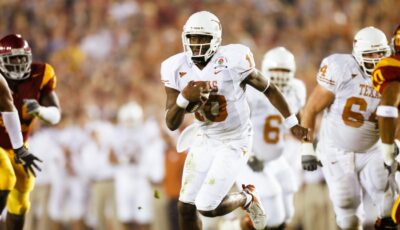
SDS Roundtable: If you were commissioner, would you play football games without fans, or postpone the season until they can return, too?
By Chris Wright
Published:
Each SDS roundtable discussion involves the SDS staff providing individual answers and comments to questions covering a wide range of sports and non-sports topics. In this discussion, we ask the question: If you were commissioner, would you play games in an empty stadium, or wait, even if that meant postponing the 2020 season?
Previous roundtable discussions:
- If you could change 1 thing about college football, what would it be?
- What are you watching right now?
- Who is your favorite SEC football player of all-time?
- What are your 3 favorite postseason moments involving SEC teams?
- Which 4 SEC athletes are on your Mount Rushmore?
- What is your most painful sports memory?
- The greatest team I ever saw …
- Which school’s all-time position group is the best in SEC history?
- Who are your way-too-early picks to make the College Football Playoff?
- If and when the SEC expands, which 2 teams should it add?
- Who is your pick to win the SEC East, SEC West in 2020?
- Who is your favorite player from every SEC program?
- Who is your favorite SEC personality to follow on Twitter?
A bit of background …
Texas A&M chancellor John Sharp said Wednesday that the SEC has discussed a possible timeline for starting the 2020 season. Nobody knows for sure whether there will be a season, but many are optimistic. All sorts of proposals have been made, including delaying the start of the 2020 season until the spring semester of 2021. Everybody understands the economic importance of playing as soon as possible.
Wednesday, Sharp said the SEC has determined it could start the season as late as October and still play 13 games.
“We don’t know when this thing is going to end, we don’t know when it’s going to happen,” Sharp said. “For all we know, we may have football where we have coaches and players and referees on the field with a TV camera and nobody in the stadium. We don’t know. But we are trying to figure all of that out. But none of that can be figured out until when we know the world goes back to work and we’ll hopefully find that out in a few weeks.”
Assuming it’s safe to play, how would we handle it: Play in empty stadiums or wait for the fans? That’s something we’ve been discussing.
Jon Cooper, SDS co-founder
My goal would be to start football as close to as on time as possible, virus pending. If that means delaying a month until October to start the season, then so be it. Getting the players on campus, healthy, practicing and ready for games would be part of this. Secondly, and only secondly, I would then move the attention to the fans. Assuming the coronavirus peaks and slows late spring/early summer, the goal would be to move fans into stadiums as soon as possible, potentially the second month of football. If the virus is unable to be contained, we’re not playing football anyway.
College football wouldn’t be the same without fans. The fans are the biggest part of what makes college football great, but fans have to be protected. Revenue from tickets is a much less part of the overall budget when compared to TV revenue.
So, the goal would be to get college football teams playing as close to the normal starting time as possible. Secondly, fans would return to the stands at some point in the season when folks are able to gather once again. The season would start without fans.
Kevin Duffey, SDS co-founder
You absolutely play with no fans if it’s possible without risking the health of the players (and coaching staffs). Part of this process involves finding creative solutions to get back to some degree of normal for Americans, and that includes sports. The onsite pageantry around college football is of course an important part of the equation, but having football without fans is much, much better than having no football at all.
Connor O’Gara, Senior national columnist
I’ll take Choice A.
Why? We’ve talked a lot during the Playoff era about how much better the in-home game experience continues to get. As strange as it would be to have empty stadiums for massive games, I think we all just want live sports right now. It would definitely take some getting used to, but I worry about what a spring season would do for a few reasons. It would certainly worsen the product for the following season with such a quick turnaround, and it would create all sorts of issues with the NFL calendar.
Here’s the other thing. If we had a year without fans, can you imagine how much attendance would boom the following years? The universities, if they could stomach just getting the TV revenue and not the home game revenue, would stand to benefit in the following years because we’d all be itching to get back into the stadiums. A fall without football still sounds so daunting. If that’s the price we have to pay to get live sports back sooner rather than later, I’d be willing to do so.
Dustin Schutte, Saturday Tradition managing editor
Choice A. As weird as it would be to hold college football games in empty venues without the electricity that a packed stadium brings to the experience, some version of the sports is better than none at all.
Plus, when you consider how much revenue the television contracts generate for conferences and schools, it would minimize the loss schools take from ticket sales, sponsorships and potentially donations.
Nobody likes the idea of barring fans from attending games, but if that were the only option, then it would have to happen from a financial standpoint.
Michael Bratton, News editor
If I’m a commissioner, it has to be option A. Losing out on the revenue generated from television money and the issues that will arise without football in the fall, like some of the other sports are currently dealing with in terms of allowing seniors to return for another season, would be a nightmare for my colleges.
Old-timers will hate to hear this, but packed stadiums are no longer necessary in sports, there’s a reason we keep adding bowl games despite the fact very few draw large crowds. The main source of revenue is television and the sport is driven because it’s an outstanding television product.
Even the best programs have been struggling to pack the house for every game and attendance has been down on an annual basis since about the time HDTVs have been affordable.
Waiting for 2021 just for the fans would be a disaster for college football. Who even knows if it will be safe for fans to be in the stands in 2021?
Chris Wright, Executive editor
Sounds like everybody is on the same page this time. That’s rare for us.
As soon as it’s deemed safe for the participants, I’d start practicing and playing.
Fans are a bonus. Not everybody has them. Not everybody has them in equal amounts. I know fans who go to games every Saturday but don’t actually go inside the stadium. They go to tailgate. I know others who know as much about their team as anybody but never go to a game. They watch every snap from home.
As long as the games are played, that passion will remain. More important, as long as the games are televised, checks will be written. Tennis players, baseball players, golfers, track athletes … pick a sport, virtually any sport other than football or basketball … and those athletes might not have a team if those checks stop.
Will empty stadiums impact the actual product? I doubt it. Power 5 football players in general, and SEC players in particular, are among the most internally motivated people on the planet. They compete like crazy in practice when nobody is watching. They compete in intramural activities when nobody is watching. They try to outdo each other in the weight room when nobody is watching. They don’t need 80,000 maniacs to flip the switch. They just need somebody across from them, fighting for the same thing.
They’re wired to compete, and that won’t change regardless of where we’re watching from.
I will propose this interesting tweak, however: If it’s safe enough to play and safe enough to attend class, I’d strongly consider the idea of opening the stands to students only, capping the number at 10% of stadium capacity and practicing safe distancing. There would be ways to do this. No groups larger than 8 sitting together. Empty rows between every group, etc., etc. The optics already are going to look weird for those watching from home, so I wouldn’t worry about that.
Safe, students-only seating would provide a unique atmosphere in a lemons-to-lemonade situation.
Managing Editor
A 30-time APSE award-winning editor with previous stints at the Miami Herald, The Indianapolis Star and News & Observer, Executive Editor Chris Wright oversees editorial operations for Saturday Down South.







